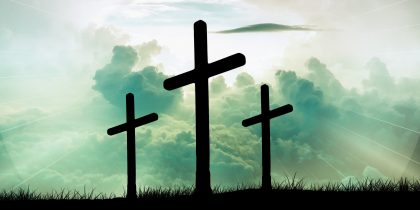“The secret things belong to the LORD our God, but the things revealed belong to us and to our children for ever, to do all the words of this law.” (Deuteronomy 29:29).
The application of this text is usually that we should concern ourselves with God's Word, because that is what God has revealed to us. That's what we have to do. But that which we do not know or cannot know, the Lord our God knows, and that may reassure us. We don't have to worry about that, nor do we need to try to understand or know about it.
But I think there is more to say about it.
The hidden things
The word 'hidden' occurs about eighty times in the Old Testament and is used in meanings such as conceal (by covering), concealing, concealing, concealing, concealing.
Often it is used to mean that a man is hidden from God (for example, Cain in Genesis 4:14) or that God is hidden from man (for example, in Job 13:24). The meaning is revealed and colored by the context and so is the text in Deuteronomy 29.
In this chapter, Moses calls all the people together (verse 2) before the Lord (verse 10) “to enter into the covenant of the Lord your God and his curse, which the Lord your God makes with you this day…” (verse 12). God affirms that they are His own people (verse 13) and warns that none of them should worship idols (verse 18) or God's wrath will burn against him (verse 20). The judgment of God then comes and is still visible for generations to come (verses 22,23) and it will be a warning to them:
“Then they will say, Because they have forsaken the covenant of the LORD God of their fathers, which he made with them when he brought them out of the land of Egypt. They went to serve other gods and bowed down to them, gods whom they knew not and whom He had not allotted to them. Therefore the wrath of the LORD is kindled against this land, and He brings upon it all these curses which are written in this book. And the LORD hath taken them out of their land in wrath, in fury, and in great wrath, and hath cast them out into another land, as it is this day” (Deuteronomy 29:25-28)
After this, this chapter closes with the text we started with. Well, if this is the context of verse 29, then you must conclude that with 'the hidden things' especially the invisible world is meant.
After all, at theserving the gods' it is precisely about the hidden things, the contact with the invisible world and the demons[1] and thereby gaining "knowledge" which you cannot otherwise obtain.
You cannot see or perceive something that is hidden with your senses. And we must not try to gain access to the invisible world, but limit ourselves to what God has revealed to us in His Word to do so.[2].
Engaging in "the hidden things" has some major consequences, which are also in the context of our first verse.
Bile and wormwood
In Deuteronomy 29 it says:
“Let no man or woman, family, or tribe be among you that turneth his heart this day from the LORD our God, to go and serve the gods of these nations. Let no root be among you that produces gall and wormwood. And it will come to pass, if upon hearing the words of this curse he blesses himself in his heart, saying: I will have peace, even if I follow my hardened heart; the abundance will take away the thirst . . .” (Deuteronomy 29:18,19)
Serving the Lord in the way that the nations serve their gods is thus called 'serving idols' by the Lord. We have already seen this in the texts in Deuteronomy 12:4, 30-31, where this important principle is set out.
Now, there should be none among the people who would thus serve the Lord, and if they did, this would be a 'root of gall and wormwood' to be. "Bill and wormwood" appear in several places in Scripture, and you may find the following in comments and explanations about them:
- They are substances that are extracted from plants
- It is seen as 'poisonous', not only from plants but also, for example, snake venom.
- It is also used as a 'narcotic'. In the latter you will find reference to poppy and opium.

Taken very literally, it means that the Lord is telling them not to grow plants whose substances they could use as drugs, putting them in a daze, under the influence, and in a state of higher consciousness.
If you take this a bit more broadly, it also means that we are not allowed to use (pagan) ways to arrive at that other consciousness.
I will be at peace
We have discussed before that when a person comes into that state of higher consciousness, he experiences harmony, peace, tranquility and love and that the distinction between good and evil diminishes or even disappears completely (see e.g. here).
When the one who thinks he is serving the Lord, but in the meantime is under demonic influence and persists in this idolatry, is confronted with God's judgment (“hearing the words of this curse”), this is simply rejected and denied. There are some revealing expressions in this 19th verse and they describe the condition of one who is in a state of higher consciousness. They describe exactly what goes on inside.
- He blesses himself in his heart. The word for 'bless' comes from 'to kneel'. You can say that he kneels to himself and sees himself as god. That is indeed what happens in the state of higher consciousness.
- “I will be at peace”. 'Peace' is not only the absence of war but also something like 'wholeness', completeness'. The idolater deludes himself that God does him no harm because there is nothing flawed in him. He sees himself as good in the sight of God, even if he continues to "follow his hardened heart."
- “I follow my hardened heart”. Interesting is the meaning of 'hardened'. The KJV says here “I walk to the imaginations[3] of my heart”[4] and the Naarden Bible says: “with the certainties of my heart I will go on.” The combination of both is exactly what happens in the higher consciousness: your perception of reality changes, you get imaginations (images) that go deep into your soul and that you take for the real reality. These are the real certainties that settle deep inside and that no one can take away from you. As a result, you are no longer open to what God really has to say to you.
- “Abundance will take away thirst”. The KJV says[5] : 'om drunkenness to add to thirst' and the Naarden Bible also has 'drunkenness' instead of 'abundance'. Drunkenness is a state in which you are "under the influence" and not of yourself, but of something or someone else. You are no longer in control of yourself and become like Paul[6] says 'carried away by the dumb idols' (1 Corinthians 12:2). There is apparently a thirst, a longing for something (or God?) that is satisfied by 'drunkenness', that state of higher consciousness in which you 'experience the real bliss'.

How admirable exactly is God's Word, which describes this condition of one who has fellowship with the invisible world. In the time of the people of Israel, but also appropriate for the present time[7].
The Lord God hides Himself
When God's people continue in idolatry, God withdraws from them. We read that also in the last chapters of this book of the Bible.
“Then My wrath will be kindled against them on that day. I will leave them and My face for them hide (…) I will surely see My face in that day hide, for all the evil it has done, for it has turned to other gods.” (Deuteronomy 31:17,18)
When God's people are concerned with the 'hidden things' and do not repent of them, God will 'hide His face from them'[8]. It is the logical consequence of 'serving the gods' and at the same time it is a judgment from God. They lose the Lord God, the sight of Who He really is disappears, as does their relationship with Him. The relationship that was so important to David and of which he prays
“My heart says to You (…) I seek Your face, O Lord, hide not Your face from me (…) Forsake me not, neither forsake me, O God of my salvation.” (Psalm 27:8-9)
Learning the song of Moses
The Lord knew how it would go, so He told Moses to write a song about these things and teach it to the Israelites. God knows that most people remember songs they've learned much more easily than lyrics prose. That is why the Israelites had to learn this song so that the Lord might remind them of these things again (Deuteronomy 31:19-22). “(…) for it shall not be forgotten nor shall it pass from the mouth of its posterity.”
It is worth reading and pondering this song (in Deuteronomy 32). I'll get a few things out of it briefly.
- It describes in a special way the goodness of God, as
“(…) the rock, Whose work is perfect, for as His ways are all straight. God is truth and not injustice; righteous and true is He.
. . . Is He not your Father who acquired you, who made you, and made you stand?
. . . For the portion of the Lord is His people, Jacob is the territory which is His possession.
(…) He surrounded him, He taught him, He protected him like the apple of His eye. As an eagle stirs up its nest, soars over its young, spreads out its wings, takes them, and carries them on its wings, so the LORD alone led him, there was no strange god with him. He made him ride on the heights of the earth, and he ate the produce of the field. He made him suck honey from the rock, and oil from hard rock; butter of oxen, and milk of sheep, along with the fat of lambs, of rams that feed in Bashan, and of goats, along with the very best of the grain of wheat, and grape blood, good wine, you have drunk.” (Deuteronomy 32:4,6,9,10-14).
- It describes the greatest injustice that God's people could do to Him, namely to serve idols
“They sacrificed to the demons, not to God; to gods they knew not (…) He said: I will set My face before them hide (…)” (Deuteronomy 32:17,20).
- God would hide and the song also describes the wrath of God and the judgment He would bring upon His people.
“They have made Me jealous of what is not God; they have provoked me to wrath with their vain idols. I will therefore make them jealous with what is not a nation, with a foolish nation I will provoke them to wrath. For a fire is kindled in My anger, it will burn to the bottom of hell, it will consume the land with its produce, and set the foundations of the mountains on fire. I will heap terrible things upon them; all My arrows I shoot at them (…) I said: I will scatter them on all sides, I will cause the remembrance of them to cease among mortals..." (Deuteronomy 32:21-26)
- God uses the enemies to punish His people Israel, but at the same time He also holds them accountable for what they do to His people. That also means God's judgment over them and ultimately there is a restoration of relations with the Lord God for God's people. The song ends with the great exclamation:(…) He will reconcile His land and His people!” (Deuteronomy 32:43). That is again His infinite goodness.
The consequences of the idolatry of God's earthly people are there to this day and the reconciliation of land and people is something that will (soon?) happen. Then they will cry out to the Lord
“Lord, hear my prayer, let my cry for help come to you. Hide not Your face from me; incline thine ear to me in the day of my distress; on the day that I call, hear me soon” (Psalm 102:2-3)
Christ the Crucified
For Christians, too, the greatest danger is falling into idolatry. That they want to experience God with our senses. Even then God will hide and that does not mean that they no longer talk about God or about 'Jesus', but it means that they are no longer concerned with Christ the Crucified. “He who is the Image of the invisible God, the Firstborn of all creation”[9] disappears from their sight. If necessary, it is occasionally referred to, but He is no longer a living reality for their hearts.
They forgot that we "Seeing God's Glory Only in the Face of Jesus Christ" (2 Corinthians 4:6).
We have already seen that this had happened to the Corinthians: they had lost Him and very easily embraced another Jesus (eg 2 Corinthians 11:3-4). But the Galatians also ran the risk of adopting a different gospel, being bewitched, and losing Christ the Crucified (Galatians 1:6,7; 3:1).

We live in the time of Laodicea, the church that doesn't even know that it has lost everything.
“I have become rich and richer and have need of nothing, but you do not know that you are wretched, pitiable, poor, blind and naked” (Revelation 3:17).
The Lord stands outside the church and He says to her
“Then be zealous and repent. Behold, I stand at the door and knock. If anyone hears My voice and opens the door, I will come in to him and dine with him, and he with Me.” (Revelation 3:19b-20)
Fortunately, He invites us to let Him in so that He can dine with us. It is not a mystical union with Him, but 'the meal' refers us to the great Sacrifice that Christ made. That we magnify, praise and honor Him and the Father for that is what He longs for! That's keeping a meal.
“Jesus answered and said to him, If anyone loves Me, he will observe My word; and My Father will love him, and We will come to him and take up residence with him." (John 14:23)
[1] See also Deuteronomy 32:17.
[2] This does not mean that God's Word has no mysteries. God hides some things (Proverbs 25:2), and the New Testament also has "mysteries." He makes them known to those who serve Him (Amos 3:7). God's Spirit makes them known to us from God's Word. See, for example, also 1 Corinthians 2:7 and Colossians 1:26; 2:2. So God's "mysteries" have nothing at all to do with the "hidden things" of idolatry.
[3] The word used here occurs 10 times in the Old Testament and always in connection with idolatry.
[4] 'I walk in the imagination of mine heart’
[5] 'to add drunkenness to thirst’
[6] The apostles call on us in several places to be 'sober' (1 Thess.5:6, 8; 1 Pet.1:13; 4:7;5:8)
[7] Recently, I did some scrubbing on the English translation of the open letter to Ann Voskamp. It is impressive how her description matches what you read in Deuteronomy 29:19.
[8] The same word is used for 'hidden' and 'hide'.
[9] Colossians 1:15



